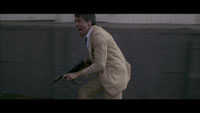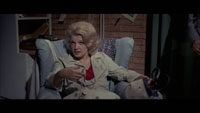**½/**** Image A- Sound A- Extras B
starring John Cassavetes, Britt Ekland, Peter Falk, Gena Rowlands
screenplay by Mino Roli, based on the novel Captive City by Ovid Demaris
directed by Giuliano Montaldo
by Bryant Frazer Tough, simple, and bereft of nonsense, Machine Gun McCain is the bare quintessence of the crime movie. Bound to and thus defined by its generic elements–the ex-convict on the make, the gangster's moll, the double-cross, the triple-cross, and the shadowy mob bosses pulling the strings–it takes a basic but unpretentiously stylish formal approach that makes the most of several terrific performances at the film's core.
|
And, God, what a cast! In the title role, John Cassavetes chews his way through a scenario that begins with his release from San Quentin and progresses quickly through a betrayal that turns into a revenge plot and finally a Mafia manhunt. McCain takes a wife, Irene (Britt Ekland), whom he poaches from two strangers in a nightclub, and rebukes his own son, Jack (Pierluigi Aprà), who's the puppet of Charlie Adamo, a wound-up mid-level operative attempting a power play behind the backs of his mob bosses. As portrayed by Peter Falk, Adamo's an aggressive pipsqueak who reeks of flop sweat and desperation. Eventually, McCain's confident career criminal plots his own caper; redemption never figures into his story. Cassavetes presents him as a cynical loner who's essentially beyond salvation. He's broken, although he's still trying to come out on top.
Seen from a contemporary vantage, there's a kick in the film's late-'60s stylings, which dwell briefly on the swinging San Francisco nightclub scene before taking a long look at Vegas in the days before the really big money built up the Strip and brazen commerce ravaged the city's charm. (It's a throwback, of course, to an era when movies took pains to shoot on actual locations.) The fashions are particularly old-school–men are generally dressed in the kind of tux that suggests serious and respectful business is being tended to, while the women are often draped in weird, angular pieces of fabric that seem designed to be shimmied out of at the foot of the bed. The music by Ennio Morricone–including a terrific swinging/swaggering theme song–adds another layer of atmosphere.
The director, Giuliano Montaldo, ran the second unit on The Battle of Algiers, but his own movies remain largely unknown, at least in the United States. (The Marco Polo TV miniseries he directed in the early 1980s did win an Emmy for its producer.) Based on the evidence of Machine Gun McCain, it's not that he's untalented, but more that he brings to the table a modest kind of professionalism. While it's tempting to assume that Cassavetes exerted some influence over Montaldo's direction, that may be unfair to Montaldo, whose film is filled with solid performances and has a connect-the-dots storyline that connects with sufficient liveliness. It's not flashy work, but it's striking, engaging a viewer's sympathies one scene at a time.
I'm especially fond of a set-piece that takes place in some sort of empty industrial building, as McCain confronts the scheming but hapless son-of-a-gun who roped him into a tight spot. ("I'm here, Baby Booby," McCain calls to him.) Cassavetes strolls coolly across a catwalk overhead, a machine gun dangling almost casually at his side. As he walks, he berates the progeny who gapes up at him stupidly, evincing no awareness that the shit is about to hit the fan. Cinematographer Erico Menczer's camera tracks through the scene urgently, precisely, glimpsing both men's faces through steel verticals that give physical form to the emotional barrier between them. Those bars also suggest McCain's now stuck in a different kind of prison, the new-life options generally afforded the newly-emancipated fast receding away from him. At the end of the film, there's another gratifying burst of camera movement, as a jerky handheld camera races to keep up with a yelping mad, battle-ready McCain.
But the picture really shifts into another gear when McCain and Irene, on the run, ask for help from an old girlfriend of his. That would be Rosemary, played by Cassavetes's own wife, Gena Rowlands, with a grand and weary brio that elevates matters entirely. Hers is a stock character, yet when she's on screen, the film is thoroughly gripping. The warmth to their scenes together brings real poignancy to the genre action. For a few minutes, Machine Gun McCain feels like a much grander film.
| Click for hi-res BD captures |
 |
 |
 |
THE BLU-RAY DISC
Blue Underground's Blu-ray release of Machine Gun McCain is, per usual for the B-movie boutique, a top-drawer affair. (And, according to the jacket copy, it represents the film's home-video debut.) The company's liner notes don't mention a transfer from the camera negative this time around, so it's more likely this came from an intermediate, perhaps a blow-up of the two-perf Techniscope source to a 'scope element. The Techniscope format was a cheap way to get a widescreen image by only using half as much film as true CinemaScope (i.e., anamorphic) requires, and this presentation seems to reflect the reduced effective resolution of the material, evincing a softness around the edges that's sometimes exacerbated by missed focus.
The 2.35:1, 1080p image is mostly, but not entirely, free of celluloid blemishes, with a wash of softly undulating grain ever-present–in fact, the precise look of the film's transfer contributes to its sterling late-'60s aesthetic. The picture has been encoded using AVC HD, and I thought I detected the occasional, fleeting motion artifact, which I took to be associated with the codec's struggle to reconcile some warping of the original elements from frame to frame at certain moments. (The movie does wobble in the frame intermittently.)
Audio is not bad but not great. The English-language 1.0 DTS-HD mono track, the only option available, sounds very clean for its age and provenance, if slightly flat. Certain characteristics of the original recordings come through, including fluctuating noise floors and perhaps a bit of distortion when dialogue levels peak. That means any digital filtering of high-frequency hiss and clicks was applied judiciously and conscientiously. I generally prefer a very light touch when it comes to audio noise reduction, though it's hard to argue with what Blue Underground has done here.
As for extras, there are similar trailers (in moderately high-quality HD) for the English and Italian markets, and there's an SD video interview with director Montaldo (23 mins.). He's a fine storyteller and the short is more entertaining than many full commentary tracks I've heard. The lion's share of his speaking time is dedicated to describing his relationship with Cassavetes, whom he says treated him with some mistrust for the first week of shooting but later warmed to him, taking a filmmaker's direct interest in helping guide the U.S.-based portion of the shoot on a very limited budget. Montaldo also has fun stories about securing locations at San Quentin and in Las Vegas, as well as shooting a chase scene with two cars rented from Hertz. It's good stuff–and for a modest Italian-American programmer given new life on Blu-ray, it's more than enough.
A final note: Blue Underground claims the film on this disc is "not rated," but the MPAA's database shows that Machine Gun McCain received a GP (the precursor to PG) in 1970. It's unclear whether this version includes any ratable content (a dollop of gunfire; a soupçon of stage blood; and just the barest dash of that perennial adversary of the MPAA: nipple) that was missing from the first U.S. release. Originally published: September 23, 2010.



